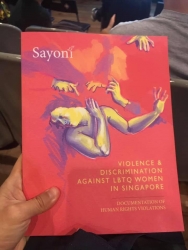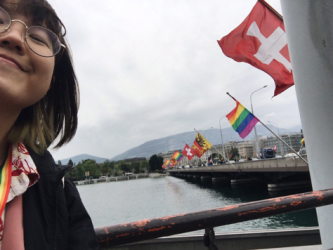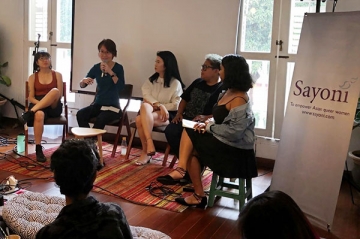The advantages of being invisible, of course, is that one gets treated equally with the rest of the population, as long as he/she doesn't come out. Even if they do come out, chances are, people will react to them more favourably than to a breast-binding butch[not that anything is wrong with a breast-binding butch, but that the mainstream is not comfortable with one] Visibility, in interesting packages like drag queens and butches, often come at the expense of what is perceived as 'normality', hence alienating the mainstream population.
There are two sides to this argument. To illustrate, I shall allude to racial identity. In the L Word, Bette, a biracial lesbian, gets challenged by an African-American lesbian, Yolanda, with regards to her racial identity. Bette's complexion is rather fair, leading people to think she is white, and hence she gets 'white privileges'. She does not hide that fact that she is half-black, and yet she does not parade it.
Now, in a world where racism is still rampant, Bette can be said to have had a good life, because she is not visibly black. She does not get passed over for promotions, or called a 'nigger' by red-necks. Is it okay for Bette to get this treatment? Or are we going to be 'fair', and say that she should suffer along with other African-American people, as Yolanda is saying?
Replace black with gay, and we have an interesting dilemma. Are we to say that everyone has to progress by the lowest common denominator? Do we have the right to make that kind of judgement, and hold everyone back, and say that the invisibles cannot proceed by 'straight privileges'? It is an interesting question, and I think, one the local gay community has to start thinking about, as we march on towards equality.
Often, the invisibles are often accused of being detached from the gay rights fight. On the surface level, this might be seen as true, because the visibles are the ones who are first identified as part of the community. They receive the first onslaught of homophobia, as hate is directed to what is more tangible. Proceeding by this logic, the visibles are the ones who will always be at the forefront of the march. People often cite the Stonewall rebellion, where the initators were supposedly transgenders, drag queens, and butches.
However, this logic is flawed. Firstly, this kind of mentality is not inclusive as their advocates seem to believe, but exclusive. They are applying the visibility = sexuality equation. Over time, this will only turn out badly, as straight people need to see both sides to accept the whole thing. Or else, all they will have are stereotypes and objectionable images to work with, in creating their mental pictures of the gay community. Furthermore, what makes people think only visible people work for the community? There are plenty of butches, effeminate men and drag queens, and whatever else, who do not give a hoot about gay rights, while there are invisible people who toil their life away for it. How do we know that the Stonewall riot did not include invisible people?
Lastly, invisibles have to come out to two sceptical groups: the straight people who don't believe they are gay because they are not effeminate/masculine/'deviant'-in-some-way, and the gay people who don't believe they are gay because they are not effeminate/masculine/'deviant'-in-some-way. As if sexual and gender expression are the sole determinants of one’s sexuality, or pride in that. Strangely enough, even though I’m completely invisible, I take more pride in my sexuality than my visible counterparts who often say their sexuality is only a tiny part of them.
Clearly, we are missing something here. We are missing the bridge between these two groups – open and honest communication about perceptions, stereotypes and expectations. We are going to have to expose ourselves to each other.
And I’m going to start by wearing my rainbow pride band.




Comments
jin said,
May 28, 2006 at 10:43 pm
Hear hear! As a fellow Invisible, I can so empathise! I am me, and what I look like does not have anything to do with who I am attracted to.
xav said,
May 28, 2006 at 10:55 pm
nice post plen-loon.
i used to be ‘visible’. life’s alot different when i have to consiously ‘out’ myself.
lublub said,
May 28, 2006 at 11:54 pm
I know this is not the focus of the topic, and I’m not sure either if this is what you imply…But i’ll just say this…cos hopefully others like me (previously) won’t do the same thing.
It’s good to be proud of your sexuality. True. However, i feel that being TOO proud of your sexuality can actually cause problems. Becos when being gay starts to FORM a large part of my identity, that’s where certain things can go downhill. Sometimes, when your life is just so wrapped up with gay issues, activism, etc. I find that, personally, i would tend to neglect the other aspects of my person which merit my attention. And in the process i can become very 1-dimensional as a person: The only TRULY special thing about me is my gay-ness cos i flaunt it so well, and i’m so immersed/captivated/motivated by it and not much else.
I also feel that as a person, you are MADE up of SO much more… if sexuality is such a large part of you, what significance is the other parts then? And also, this seems to imply that being gay = your identity (when truly, your identity emcompasses so much more). Yes its true that being gay makes us different. But how MUCH difference is that? Only the gender you prefer in love right? We are just as diverse as everyone else. For example, some people like ice cream, some don’t. Some people are fat, others aren’t. Similarly, we (lesbians) like girls while the straight girls like men! If we really want to ‘normalise’ and claim that homosexuality is part of our nature, then in a way, we should treat it just like our preference for ice cream or body shape.
I made the mistake once of making my sexuality a BIG part of my identity and put it above other things; that i start to see myself … stop growing in other areas. Plus, i discovered that it wasn’t just me who saw it, a few of my other straight friends could see it within me too. And the pitfall i was in.
By this i don’t mean that we shouldn’t engage in activism. Or wear a pride badge. Don’t get me wrong, I AM proud of my sexuality. But what i mean is that there is so much more out there… and being gay is really, only a small part of life.
pleinelune said,
May 29, 2006 at 1:29 am
Well it is not the focus, of course, and I implied nothing of the sort. I do believe the POV you just expressed merits an article of its own, lublub, and shouldn’t be left as a comment alone. :)
y said,
May 29, 2006 at 3:01 am
As someone relatively “invisible”, I’ve heard so many straight friends apply stereotypes when talking about gay men and women. I really believe that this is largely due to under/mis-representation in the media. If shows like The L Word were to be broadcast on TV (huge huge “IF”, I know), people might be able to associate the word ‘lesbian’ with so much more than masculinity. And there is, of course, that whole argument about lesbian/bisexual women being portrayed as murderers or psychopaths (think Basic Instinct), or as women who have dalliances with women but eventually need a man (think the O.C.).
Some might say that the poor portrayal of lesbian/bisexual women is incidental and sporadic, or that straight people are portrayed negatively in the media too. But with so few lesbian/bisexual women being represented on TV or in movies, these negative portrayals take up a pretty large percentage. Moreover, we need positive portrayals to open minds, if not just to undo all the damage that has already been done by the media and perpetuated by society at large.
jade said,
May 29, 2006 at 11:39 am
Speaking of which, check out commercial closet. don’t know if the tags work here, i hope it does.
RSS feed for comments to this post